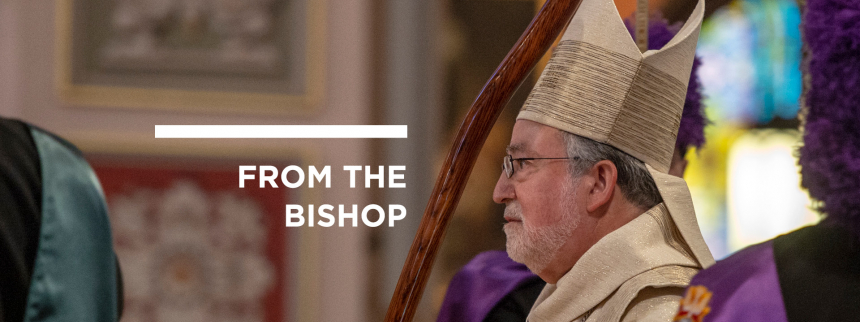
Over the course of this protracted pandemic, I have received a variety of facial coverings to use during Mass and other public settings to curb the spread of the coronavirus. Some have crosses weaved or printed on them. Others are plain black, to match my regular clerical attire. I have a face covering with the word “hope” and another which says, “Protect every life.”
The facial covering that elicits the most reaction is the one which bears the logo of the Society of St. Vincent de Paul. It is not an easily recognizable logo like those of large corporate or social media organizations, but for those who belong to the Society seeing the logo quickly brings a smile.
The Vincentians – as they call themselves – work diligently, quietly and devoutly with many of the families most afflicted by the many medical, social and personal consequences of the COVID-19 pandemic. Some of the good work of the Society was disrupted by the public health protocols required to arrest the spread of infections. In time, many Vincentian councils came up with innovative ways to keep the mercy of God flowing to their neighbors in need.
I am mindful to bring my Vincentian facial covering when I offer Mass. Wearing the mask while distributing Holy Communion reminds me – and hopefully others – of the intrinsic sacramental bond between the Holy Eucharist as the Sacrament of Charity and the Church’s charitable works of mercy, among which are the exemplary endeavors of the men and women of the Society of St. Vincent de Paul.
I have worked with the Society since my time in the Diocese of Orange. I was accustomed to attending the board meetings for different Catholic and secular charitable organizations. What left a lasting impression on me while attending meetings of the Society’s Board of Trustees was the amount of time they dedicated at every meeting to prayer and reflection.
My busy schedule often tempted me to leave the meeting early, but then the members would begin to share their experiences of home visitations or personal experiences with the poor. Seldom were their testimonies an occasion to boast. They spoke about what they learned from the poor and how a certain home visit became an epiphany of Christ’s presence. I learned much from the humble servant spirituality among the members of the Society.
Coming to the Diocese of Sacramento, I found an equally robust, innovative and devout Society that continues to thrive throughout the north state with the same heartfelt desire to meet the Lord Jesus among the poor of our neighborhoods.
The Diocese of Sacramento, along with all the dioceses of the United States, is inaugurating a Eucharistic Revival on the Feast of Corpus Christi, Sunday, June 19, 2022. The simple mission of the revival is “to renew the Church by enkindling a living relationship with the Lord Jesus Christ in the Holy Eucharist.”
Pope Emeritus Benedict XVI began his synodal Apostolic Exhortation on the Eucharist (2007), Sacramentum Caritatis (Sacrament of Charity), with the following words: “The sacrament of charity, the Holy Eucharist is the gift that Jesus Christ makes of himself, thus revealing to us God's infinite love for every man and woman.” (SC, 1) Later in the document Pope Benedict reflected on the consequences this profound sacramental mystery:
Our communities, when they celebrate the Eucharist, must become ever more conscious that the sacrifice of Christ is for all, and that the Eucharist thus compels all who believe in him to become "bread that is broken" for others, and to work for the building of a more just and fraternal world. Keeping in mind the multiplication of the loaves and fishes, we need to realize that Christ continues today to exhort his disciples to become personally engaged: "You yourselves, give them something to eat" (Mt 14:16). Each of us is truly called, together with Jesus, to be bread broken for the life of the world. (SC, 88)
These words from the apostolic exhortation of Pope Benedict provide us with insight for understanding the purpose of the upcoming Eucharistic Revival. Enkindling a living relationship with the Lord Jesus in the Eucharist means becoming personally engaged with the sacramental charity of Christ. Is this not what Jesus commands of his disciples on the night before he died? “As I have done so you should also do,” said the Lord to his disciples in the Gospel according to John.
Pope Benedict's apostolic exhoration followed a world Synod of Bishops convened in October, 2005 concluding the “Year of the Eucharist” inaugurated by Pope St. John Paul II. The Eucharistic Revival inaugurated by the U.S. Conference of Catholic Bishops draws its inspiration from the work of these two previous popes. It will also be supported by the reflections and conversations conducted to prepare for the next Synod of Bishops convoked by Pope Francis.
The vibrant spirituality that I have found in the Society of St. Vincent de Paul is a good Catholic asceticism as we approach the Eucharistic Revival to join ourselves with the Lord Jesus in the Eucharist and become the one bread, the one body of Christ broken for the many. Take advantage of the Lenten and Easter seasons to begin a personal revival of reverence for the awesome charity of Christ crucified given to us under the appearance of bread and wine.
May the Lord’s sacrificial charity inspire us to reverence his presence in our neighbors who are poor and sacrifice ourselves for them. Pope Benedict reminded us: “Indeed, union with Christ is also union with all those to whom he gives himself. I cannot possess Christ just for myself; I can belong to him only in union with all those who have become, or who will become, his own.” (SC, 89)

